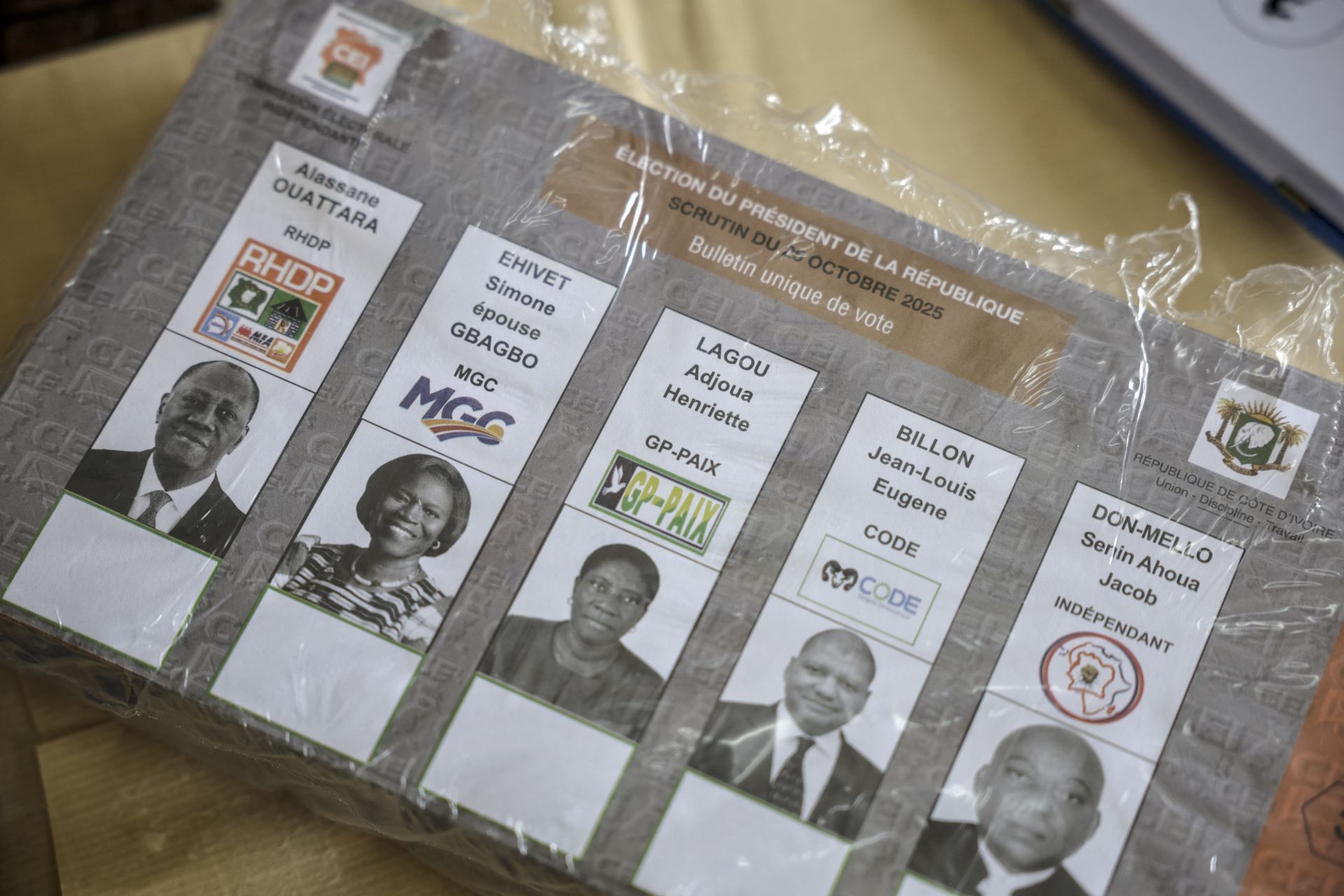- Home
- Middle East
- Peaceful Voting but Little Suspense in Ivory Coast Election

A general view of a ballot paper on October 25, 2025 before polls open during Ivory Coast's presidential elections. ©Emmanuel Croset / AFP
Ivorians were voting Saturday between incumbent President Alassane Ouattara, the overwhelming favorite seeking a fourth term in power, and an opposition hobbled by the barring of leading candidates.
Ouattara, 83, has wielded power in the world's top cocoa producer since 2011, when the country began reasserting itself as a West African economic powerhouse.
Turnout will be key. Nearly nine million Ivorians are eligible to vote in the polls, which close at 6:00 pm (1800 GMT), choosing between five contenders, including Ouattara, who is hoping to avoid a run-off.
"The life of a nation depends on voting. It's the only motivation for me," Ibrahim Diakite, a bus driver who was casting his ballot in a pro-Ouattara suburb of Abidjan, told AFP.
But Ouattara's leading rivals – former president Laurent Gbagbo and former Credit Suisse CEO Tidjane Thiam – have been barred from standing, the former for a criminal conviction and the latter for acquiring French nationality.
With the opposition calling for protests and unrest turning deadly in recent days, the government has slapped a nighttime curfew in place in some areas and deployed 44,000 security forces.
Ivorians who spoke with AFP appeared sanguine.
"In previous years, there were more tensions than this year," Mamadou Bamba, an unemployed man in his fifties in Abobo, told AFP.
"We are voting today in peace. Our hope is for the day to pass without incident," said Severine Kouakou, a 46-year-old voter in Bouake, the country's second-largest city.
"It is hard to imagine any surprise at the end of this election... since opposition heavyweights aren't present," Gilles Yabi of think tank Wathi told AFP.
Banned Rallies
Four people, including one policeman, have died in sporadic political unrest in recent weeks, while on Monday, an independent electoral commission building was torched.
The government has responded by banning demonstrations, and the judiciary has sentenced several dozen people to three years in prison for disturbing the peace.
The security forces were deployed across the country of 30 million to keep protests in check, especially in former opposition fiefdoms in the south and west.
A nighttime curfew was in place on Friday and Saturday in the Yamoussoukro region, where the political capital is located.
Authorities say they want to avoid "chaos" and a repeat of unrest surrounding the 2020 presidential election, in which 85 people died.
“More Fear Than Harm”
"I ask you to closely monitor your neighborhoods... We must be ready to protect Ivory Coast," Ouattara said during his final rally on Thursday.
"The election is frightening, but we dare to believe there will be more fear than harm," said Ibrahime Kuibiert Coulibaly, head of the Independent Electoral Commission.
On Wednesday, Gbagbo condemned the poll as a "civilian coup d'etat" and "electoral robbery."
"Those who could have won have been eliminated. I do not accept this," he said without giving clear directions to his supporters for Saturday's ballot.
Four Candidates
None of the four rival candidates represents an established party, nor do they have the reach of the RHDP.
Former trade minister and agri-businessman Jean-Louis Billon, 60, hopes to rally backers from his former stable, the Democratic Party.
Former first lady Simone Ehivet Gbagbo, 76, is looking to garner votes from supporters of her ex-husband.
The left-wing vote hangs in the balance between Simone Gbagbo and Ahoua Don Mello, a civil engineer and independent Pan-African with Russian sympathies.
Then there is centrist Henriette Lagou, a moderate who also stood in the 2015 presidential poll, garnering less than one percent.
Ouattara came to power following the 2010-2011 presidential clash between him and Gbagbo, which cost more than 3,000 lives among their supporters.
The government points to several years of strong economic growth and general security, despite jihadist threats on its borders.
Critics deplore the fact that the undisputed growth has only benefitted a small portion of the population and has been accompanied by a spiraling cost of living.
Nearly 1,000 civilian observers from Ivorian society are monitoring the vote, alongside another 251 from west African economic bloc ECOWAS and the African Union.
Results are expected early next week.
AFP
Comments